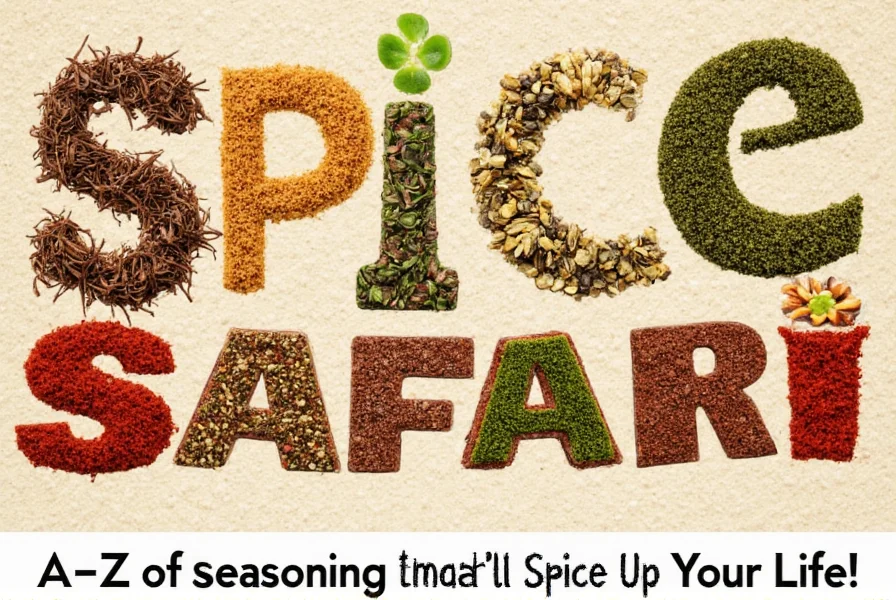
Welcome to your ultimate A-to-Z seasoning guide! Whether you're a curious home cook or a seasoned chef, this comprehensive reference will help you navigate spices alphabetically with accurate information, practical usage tips, and expert storage advice.
| Section | Spices Covered | Key Features |
|---|---|---|
| A-F | Allspice, Basil, Chili Powder, Cinnamon, Cumin, Fennel Seeds | Foundational flavors for global cuisines |
| G-L | Garlic Powder, Ginger, Lemongrass | Essential aromatics for savory dishes |
| M-R | Marjoram, Mustard Seeds, Nutmeg, Oregano, Paprika, Parsley, Rosemary | Versatile ingredients for diverse cooking styles |
| S-Z | Saffron, Star Anise, Sumac, Thyme, Turmeric, Za'atar | Exotic and specialty spices for elevated dishes |
Why Alphabetizing Seasonings Works

Organizing your pantry by seasonings in alphabetical order creates a consistent, intuitive system that works for everyone in your kitchen. Unlike cuisine-based or frequency-based systems that change over time, alphabetical order provides a predictable structure that reduces confusion and saves time during meal prep.
This method is especially valuable for teaching beginners and children about cooking ingredients, as they can easily locate spices like 'Cumin' or 'Paprika' without needing specialized culinary knowledge.
A-F: Foundational Seasonings
| Spice | Flavor Profile | Best For |
|---|---|---|
| Allspice | Peppery & sweet with clove-like warmth | Stews, pies, jerk marinades |
| Basil | Herbaceous, fresh, slightly peppery | Pasta sauces, salads, pesto |
| Chili Powder | Smoky, earthy, spicy | Tacos, chili, barbecue rubs |
| Cinnamon | Sweet, warm, woody | Desserts, oatmeal, spiced tea |
| Cumin | Earthy, nutty, smoky | Mexican, Indian, Middle Eastern dishes |
| Fennel Seeds | Licorice-like, sweet | Italian sausages, bread, braised veggies |
These foundational seasonings form the backbone of countless recipes. Allspice is particularly versatile, mimicking a blend of cinnamon, nutmeg, and cloves. For cumin, remember that ground coriander can be a decent substitute (use half the amount) when you're out of stock.
Pro Tip:
- Always smell each spice before using it to avoid confusion between similar-looking powders like chili powder and paprika.
G-L: Essential Aromatics
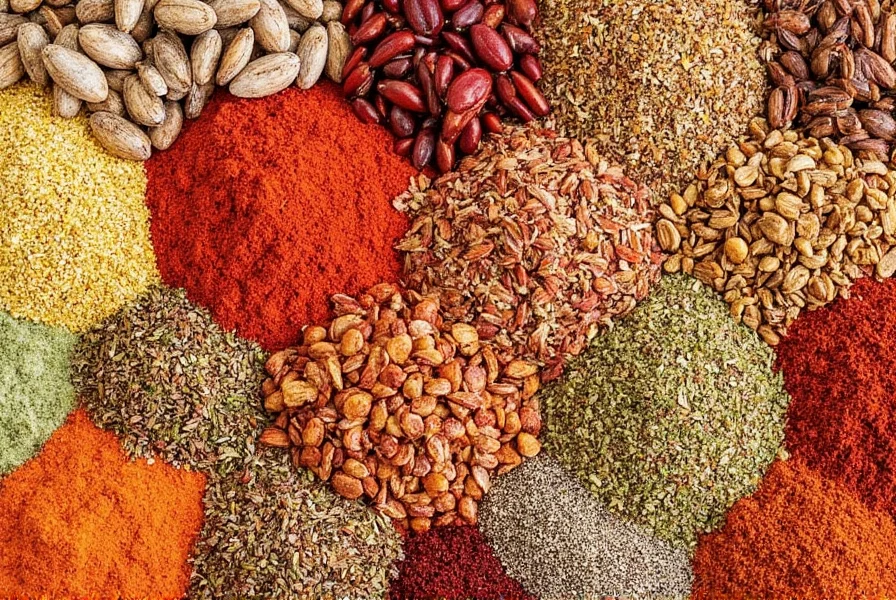
| Spice | Flavor Profile | Best For |
|---|---|---|
| Garlic Powder | Oniony, savory, rich umami | Rubs, dressings, soups |
| Ginger | Spicy, warm, aromatic | Asian stir-fries, baked goods, teas |
| Lemongrass | Citrusy, floral, bright | Thai curries, soups, marinades |
These ingredients bring distinctive aromatic qualities to dishes. Lemongrass is essential for authentic Thai and Vietnamese cuisine - use the tender lower part of the stalks for maximum flavor.
Did You Know?
- For bold flavor in curries or stir-fries, use fresh ginger root instead of ground ginger for more intense heat and complexity.
M-R: Versatile Seasonings
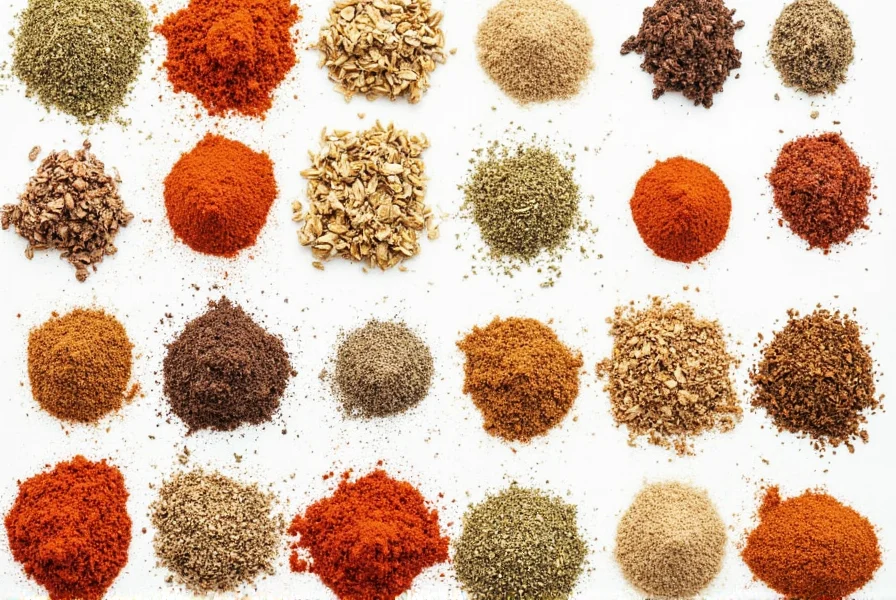
| Spice | Flavor Profile | Best For |
|---|---|---|
| Marjoram | Mild, floral, citrusy | Mediterranean dishes, lamb, bean soups |
| Mustard Seeds | Sharp, tangy, nutty | Pickling, tempering in Indian dishes |
| Nutmeg | Sweet, warm, nutty | Baked goods, creamy sauces, eggnog |
| Oregano | Robust, earthy, slightly bitter | Pizza, tomato sauces, grilled meat |
| Paprika | Sweet, smoky, vibrant red color | Paprikash, deviled eggs, roasted vegetables |
| Parsley | Fresh, grassy, mild bitterness | Garnish, tabbouleh, chimichurri |
| Rosemary | Pine-like, herbal, fragrant | Roasted potatoes, lamb, focaccia |
These seasonings offer incredible versatility across many cuisines. Nutmeg isn't just for desserts - a pinch in béchamel sauce transforms it from simple to sublime. Rosemary has such a strong aroma that a little goes a long way - try infusing it in olive oil for a gourmet finishing touch.
Fun Fact:
- Crushed mustard seeds mixed with vinegar make an excellent homemade condiment that beats store-bought versions any day.
- When roasting chicken or pork, sprinkle dried marjoram under the skin for a delicate, herb-forward punch.
S-Z: Exotic and Specialty Spices
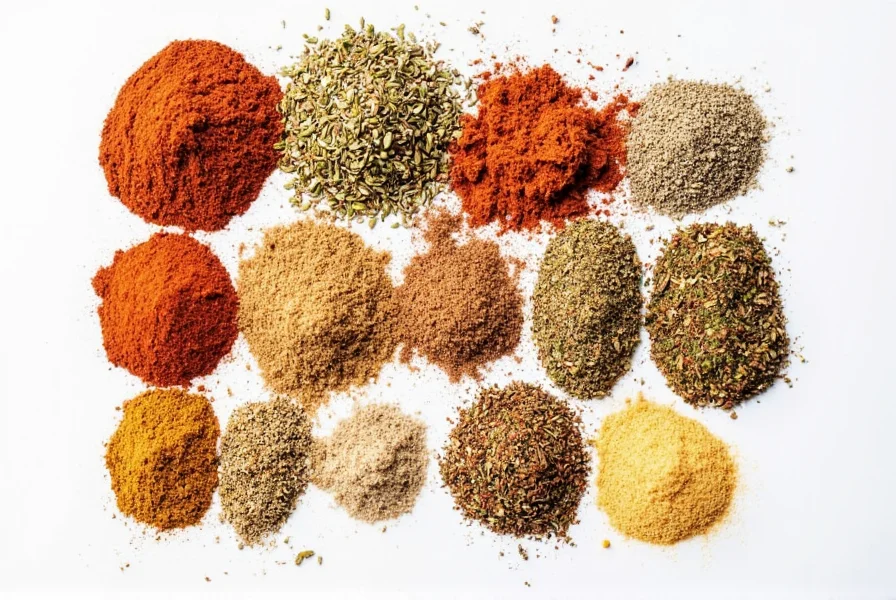
| Spice | Flavor Profile | Best For |
|---|---|---|
| Saffron | Floral, honeyed, slightly metallic | Paella, risotto, desserts |
| Star Anise | Strong licorice flavor | Pho broth, mulled wine, braises |
| Sumac | Tangy, lemony, bright | Middle Eastern salads, kebabs, hummus |
| Thyme | Earthly, minty, floral | Roasts, stews, herbes de Provence |
| Turmeric | Eartly, slightly bitter, golden hue | Curries, rice, golden milk |
| Za'atar | Herbal, tangy, sesame nuttiness | Dips, flatbreads, roasted veggies |
These specialty spices elevate dishes from ordinary to extraordinary. Sumac and za'atar are particularly versatile - sprinkle them over avocado toast or labneh for instant flavor magic. Saffron is worth the investment for special occasions - soak the threads in warm water for 20 minutes before use to fully release their color and flavor.
Pro Chef Hack:
- Toast whole star anise briefly in a dry pan to unlock its full aroma before adding to broths or stews.
Buying Guide: How to Choose the Best Seasonings
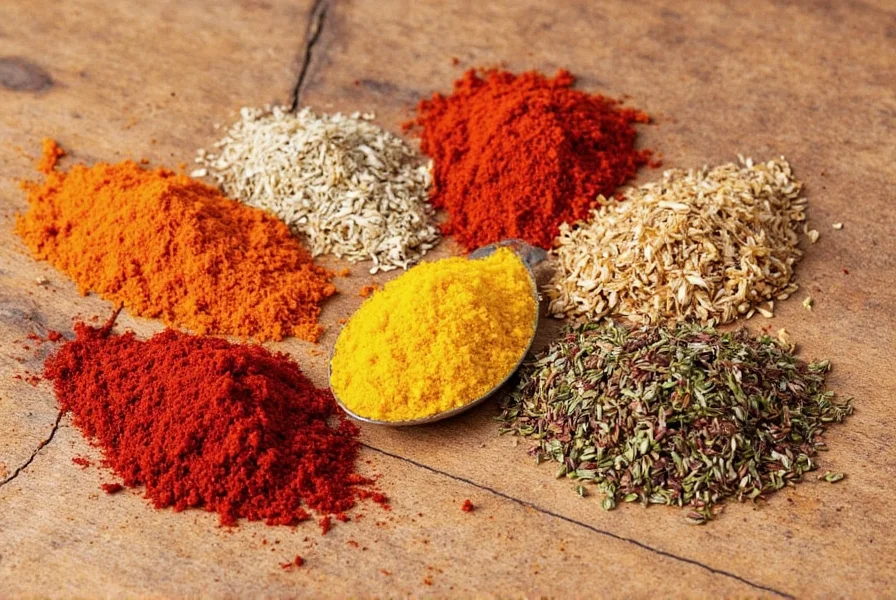
| Product Type | Features | Advantages | Best For |
|---|---|---|---|
| Whole Spices (e.g., Cumin Seeds) | Un-ground, retain oils longer | Last longer, richer flavor when freshly ground | Curries, tempering, DIY blends |
| Ground Spices (e.g., Paprika) | Ready-to-use, fast flavor infusion | Convenient, ideal for quick meals | Baking, rubs, sauces |
| Blends (e.g., Garam Masala) | Premixed combinations for specific cuisines | Save time, ensure balance | Indian cooking, short prep time |
| Herb Mixes (e.g., Herbes de Provence) | Dried herbs combined for flavor harmony | Versatile, no need to measure individually | Roasts, Mediterranean dishes |
| Exotic Spices (e.g., Sumac) | Unique regional ingredients | Add flair, cultural authenticity | Specialty dishes, impress guests |
What to Look For:
- Packaging: Opt for air-tight containers or resealable bags to preserve flavor.
- Expiration Dates: Check the "best before" date; fresher is always better for potency.
- Color and Aroma: Fresh spices should have vivid colors and strong aromas.
- Brand Reputation: Trusted brands often offer consistent quality (we recommend Penzeys, McCormick Gourmet, and Simply Organic).
Storage Tips for Maximum Shelf Life
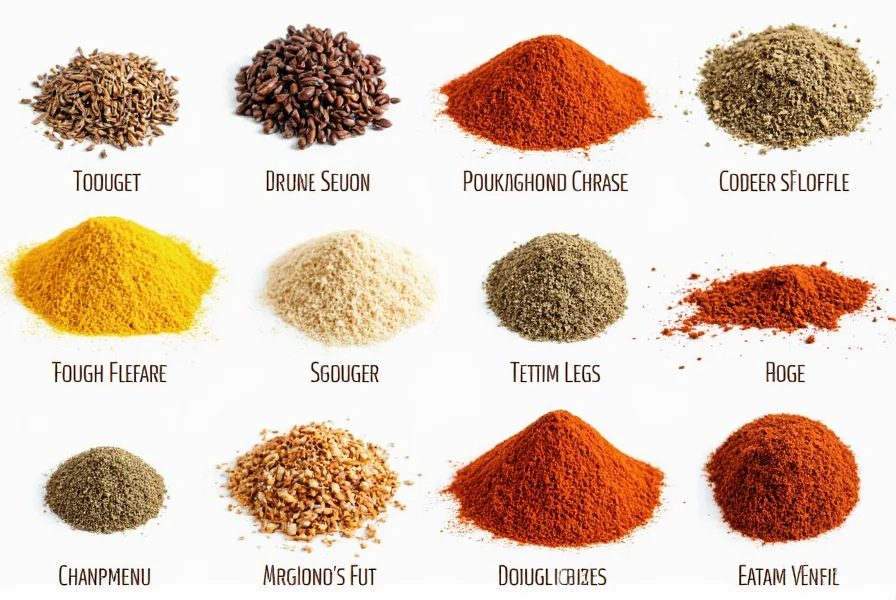
| Type of Spice | Estimated Shelf Life |
|---|---|
| Whole Spices | 3–4 years |
| Ground Spices | 2–3 years |
| Dried Herbs | 1–3 years |
| Blends & Mixes | 6 months–1 year |
| Sea Salt & Coarse Pepper | Indefinite |
- Light Protection: Store spices away from direct sunlight in a cool, dark cupboard.
- Air Tightness: Use screw-top or flip-top lids to minimize oxygen exposure.
- Moisture Control: Avoid using wet spoons in spice jars. Consider silica packs in humid areas.
- Labeling: If you make your own blends, label them clearly with the name and date.
Warning Signs It's Time to Replace:
- Smells weak or musty
- Looks faded or discolored
- Has clumps or signs of moisture damage
- No noticeable flavor boost when used
Frequently Asked Questions
Why should I organize my seasonings alphabetically instead of by cuisine or frequency of use?
Alphabetical organization creates a universal system that works for everyone in your household or kitchen. Unlike frequency-based systems that change as your cooking habits evolve, alphabetical order remains consistent. It also makes teaching others about your spices easier, as there's a logical, predictable pattern to follow. When you're mid-recipe and need to find "oregano" quickly, you know exactly where to look without having to remember your personal categorization system.
How many essential seasonings should a beginner's pantry contain?
For a well-rounded beginner's pantry, aim for 10-12 essential seasonings that cover a range of flavor profiles: salt, black pepper, garlic powder, onion powder, paprika (both sweet and smoked), cumin, oregano, thyme, cinnamon, red pepper flakes, bay leaves, and a versatile herb blend like Herbes de Provence. These will cover most basic cooking needs across various cuisines. As you become more comfortable, you can gradually expand your collection with more specialized spices like sumac, za'atar, or cardamom.
What's the difference between herbs and spices, and does it matter for alphabetical organization?
Herbs come from the leafy parts of plants (like basil, parsley, and thyme), while spices come from other plant parts like seeds (cumin), roots (ginger), or bark (cinnamon). For alphabetical organization purposes, the distinction doesn't matter—you should include both in your A-Z system. This creates a comprehensive reference where you can easily find any seasoning regardless of its botanical origin. Many recipes call for both herbs and spices, so having them integrated alphabetically makes recipe execution more efficient.
Can I substitute one spice for another if I don't have what a recipe calls for?
Yes, but with some caveats. Some good substitutions include: coriander for cumin (use half the amount), marjoram for oregano (they're in the same family), and allspice for a cinnamon-nutmeg-clove blend. However, be cautious with strong-flavored spices like rosemary or cloves, which don't have perfect substitutes. The key is understanding flavor profiles—earthy spices can often substitute for other earthy ones, and citrusy herbs for other citrusy herbs. When in doubt, start with half the recommended amount of your substitute and adjust to taste.
How can I extend the shelf life of my alphabetized spice collection?
To maximize shelf life in your alphabetized system: 1) Store spices in airtight containers away from light, heat, and moisture; 2) Consider transferring bulk spices to smaller containers to reduce air exposure; 3) Keep whole spices whenever possible and grind them as needed; 4) Label each container with purchase date; 5) Place less frequently used spices toward the end of your alphabetical arrangement where they won't be disturbed as often. Remember that even with perfect storage, ground spices generally lose potency after 2-3 years, while whole spices last 3-4 years.
What's the most common mistake people make with alphabetized spice collections?
The most common mistake is not maintaining the system consistently. People start strong with alphabetical organization but then add new spices wherever there's space, defeating the purpose. Another frequent error is not labeling spices clearly with both name and purchase date. Additionally, many people don't realize that some spices like paprika and chili powder look similar, so proper labeling is crucial. Finally, people often overlook that blends like "curry powder" or "pumpkin spice" should be included in the alphabetical system (under C and P respectively) rather than stored separately.
Final Thoughts on Seasoning Like a Pro
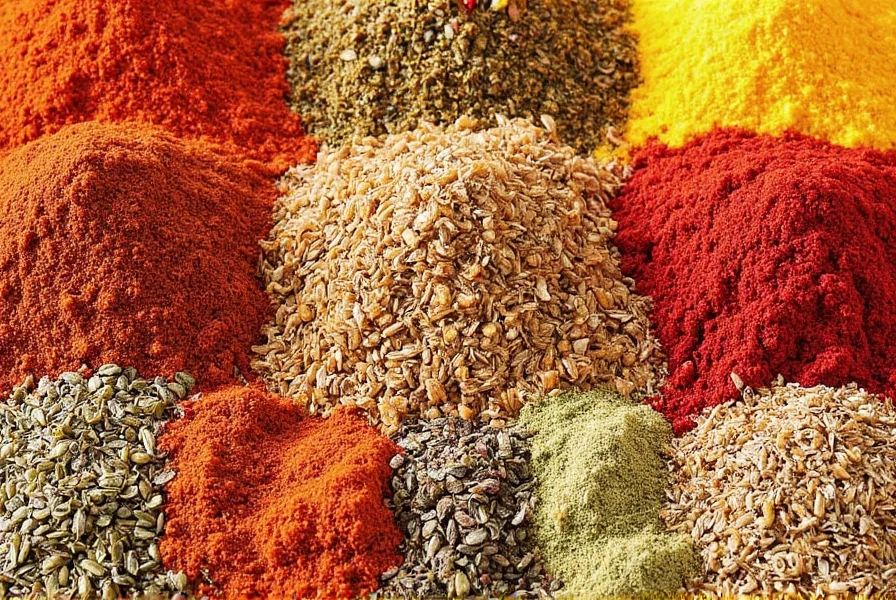
You've now got a comprehensive, accurately organized reference for mastering seasonings like a culinary professional. Remember: great cooking starts with great seasoning—not just salt, but a symphony of spices working together to enhance every bite.
Whether you're making a comforting stew, a zesty salad, or a decadent dessert, knowing your seasonings inside-out will transform your cooking forever.
Key Takeaways:
- Keep your spices organized alphabetically for faster access and creativity.
- Know each spice's flavor profile to build balanced recipes.
- Buy high-quality spices and store them properly to maximize flavor longevity.
- Experiment with international spice blends to broaden your culinary horizons.
So next time you reach for that bottle of thyme or paprika, don't just shake it in blindly—know exactly what you're adding and why. Happy seasoning!

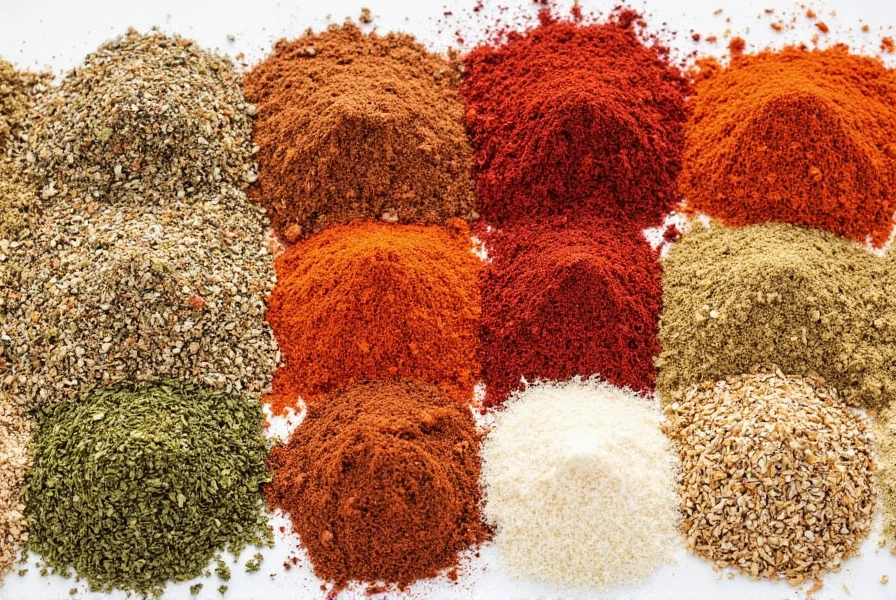









 浙公网安备
33010002000092号
浙公网安备
33010002000092号 浙B2-20120091-4
浙B2-20120091-4